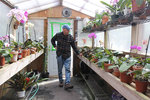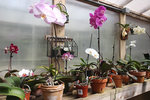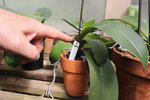Dick Schneider wants that orchid in the corner of your room, the one you think is dead or dying.
He's about to explain why and show what he's done with hundreds of orchids that have been donated …
This item is available in full to subscribers.
We have recently launched a new and improved website. To continue reading, you will need to either log into your subscriber account, or purchase a new subscription.
If you had an active account on our previous website, then you have an account here. Simply reset your password to regain access to your account.
If you did not have an account on our previous website, but are a current print subscriber, click here to set up your website account.
Otherwise, click here to view your options for subscribing.
* Having trouble? Call our circulation department at 360-385-2900, or email our support.
Please log in to continue |
|




Dick Schneider wants that orchid in the corner of your room, the one you think is dead or dying.
He's about to explain why and show what he's done with hundreds of orchids that have been donated to him over the past three years.
But first, he wants to share some history about what he does and how he became an accidental orchid doctor.
A retired businessman and scientist, Schneider has been working behind the Jefferson County farming scene for the past decade on his 17-acre RainCoast Farms, 3 miles south of Port Townsend. He's been experimenting to see which tomato plants, peppers, eggplants, berries, apples, plums and pears grow best in the Pacific Northwest.
RainCoast isn't a commercial operation. Schneider donates his knowledge to local farmers, when they want it. He takes just a little bit of credit for the bounty of tomatoes that are now available at the Port Townsend Farmers Market. Tomato varieties were his first love.
Then there is the Orchid Recovery Project, a word-of-mouth labor of love known only to a handful of people.
Orchids are one of the most common houseplants in America, Schneider says, before opening the door of a small shed that houses his orchid project. Orchids used to sell for $50, even $60. Now they can be had for $8.
As their prices have dropped, orchids have become popular for people to give to loved ones recovering from an illness.
“They're cheaper than a bouquet and they last maybe three to five months,” says Schneider. Flowers are nice, but people perk up when they see the tall, colorful, delicate orchid, he says. It's a gift to remember, to keep. Doctors also get them from patients as thank-you gifts.
But then the blossoming keepsake dies – or looks like it's dying. Doesn't matter who has it, patient or doctor. It just stops blooming.
And that's how it all started for Schneider.
“One of my sons is a doctor, and he said, 'I get these orchids from patients. You make things grow. Why not see if you can get them to rebloom?’” Schneider says of the first four orchids and the friendly challenge he accepted about three years ago.
“I didn't know an orchid from a beet, but I said I'll try. And in about seven months, I got them to bloom.”
BLOOMING ENDEAVOR
Finally, Schneider opens the door to the shed.
There's a burst of color. Dozens of orchids are gathered in various stages of recovery. Some are blooming as if fresh from the nursery. Some look like pots of leaves.
Word got out about what Schneider could do, and “pretty soon, they started showing up, these waifs,” he says.
It turns out that these white and purple and pink and lavender exotic flowers like it warm in the day and cool at night, and need a daily temperature change to be happy.
“They like a range of 55 degrees at night and 75 degrees in the day,” says Schneider, examining the orchids like a doctor making patient rounds.
“I've learned which ones will make it, which ones won't,” he says.
He points out one that won't. There's nothing growing in its center It's probably a goner. But Schneider is going to keep it, give it a chance.
“There are plants in here I've had for three years that have never flowered. I'm still waiting.”
THE CHARTS
And just like a doctor, Schneider and his greenhouse manager, Nancy Buerner, keep patient records of each and every orchid. (He also keeps meticulous logs of how many tomatoes he gets on every tomato plant and goes so far as to rate the taste of each variety of tomato.)
When an orchid is donated, he takes a photo of it, jots down the date it was donated, and keeps the name and contact information of the donor.
Once word got out that Schneider could resurrect the dead and dying, “I felt like the [dog] pound. They were bringing me all kinds of stuff.”
And then the question arose of what to do with them.
“I came up with the idea that I'd donate any of the blooming orchids to Jefferson Healthcare, and pretty soon hospice was calling and people were coming by if they had a friend in chemo. They learned they could get an orchid for free. The project started growing.”
The Orchid Recovery Project took root.
Schneider figures he's cared for almost 500 orchids. Actually, he can check the list he keeps. It's 488 orchids, to be exact. He's given away about half of them.
“When they recover, I take a picture of it and give it to the donor and say, 'Your orchid was donated to a cancer patient,’” he says.
Now, there is a small problem. The orchid hospital room may look like it's full, but Schneider says there's lots more space.
“In order for the project to continue, I need more orchids,” Schneider says.
RETURNS RARE
Once the recovered orchids are donated to someone, the orchids rarely come back for a second round of greenhouse therapy, Schneider says. He's not sure why.
“I think people remember how they got them and I think it's hard to give them away. There's a note that goes with them that says it's OK to return them,” he says, explaining the information given to those to take the recovered orchids home.
Sometime go, Schneider, who has a doctorate in biochemistry, was asked to speak to a botany class at the University of Washington. He had noticed a lot of orchids while at the UW and so ended up talking about his project to the class. That also netted him a few more waifs, as well as a few exotic and even endangered orchids.
In addition to the hundreds of store-bought orchids, he has his own collection of about 800 orchids, which he keeps in another greenhouse. It, too, is bursting with color.
His wife, Anne, told him he needed to get out and about and talk about his project. So he came up with a talk titled “Sex and the Single Orchid.” He's spoken to members of the Gardiner Garden Club and he's talked to garden lovers in Port Ludlow and the Tri-Area. He's donated orchids to auctions, in addition to the hospital and hospice.
But the truth is, as far as Schneider is concerned, there's room for many, many more orchids in need.
Tomatoes used to be Schneider's big challenge, and they still interest him.
But there's something about orchids that has captivated Schneider.
“Who knew? I spent most of my time growing tomatoes and now I'm talking about orchids.”